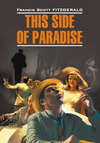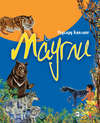Kitabı oku: «The Pirate of the Mediterranean», sayfa 8
Chapter Nine.
One of the most valuable qualities which a person can possess, is presence of mind. Our safety and our life, and the safety and the lives of others, frequently depend on it. Some people are endued with it naturally – they never act without thought, and they in a moment perceive what is best to be said or done. Others act from impulse, without consideration, and though they may now and then do what is right by chance, they are more likely to do what is wrong; like the Irish seaman, who, when ordered to cut a rope to which he was hanging, cut above his head instead of below his feet, and came down by the run. I believe that it is very possible to attain a presence of mind which one does not naturally possess, by constant practice and attention, though I suspect the task would be found very difficult.
When Ada saw the paper drop from the hand of the young Italian mariner, her first impulse was to call out to him in order to restore it, but the look he gave as he left the cabin, convinced her that he had done so purposely, and feeling that if so, it was certainly of importance, as she did possess the quality of which I was speaking, she sprang forward to secure it. The paper she saw, as she returned to her seat, was the blank leaf of a book, torn hastily out, and folded up in the form of a note; but on opening it there appeared to be nothing written on it.
“Why, what is that you have got there, Ada?” said Colonel Gauntlett.
“Oh, I fancied that I had discovered an important document, and, lo and behold, it turns out to be merely a blank paper,” returned the young lady laughing. “One cannot help conjuring up some romantic incident in these lovely seas, and forgetting that in these matter-of-fact days nothing of the sort is likely to occur; but I believe after all there are some pencil marks on the paper.” She held it up closer to the light, and as she did so, her countenance grew graver. There were a few lines written in pencil, but so faint that it was not surprising she should, at first, not have remarked them. They were in Italian, and in the peculiar handwriting of the people of that nation.
“Trust not to appearances,” they said. “Avoid the polacca brig. The story told you is false.” At the bottom were the words, “An unwilling actor,” as if intended for a signature. There was nothing more to show by whom they were written, though there could be but little doubt that they were so by the young mariner, or by somebody who had employed him. Ada translated them to her uncle, who was at a loss to comprehend their meaning, further than that they contradicted the story they had just heard from the lips of the very man who dropped the paper. He thought over them for some time, and then summoned Mitchell, whom he directed to request the captain’s presence.
Ada was again called to translate them, when the captain appeared.
“And what do you think of them?” the colonel asked him.
“Why, sir, that they serve to confirm my suspicions, and those of my mate, that the felucca is not honest, and that there is a good deal of mystification going on somewhere or other.”
“Then you don’t believe the story of the Austrian brig having sent the felucca to us?” asked the colonel.
“Not a bit of it, sir; and my firm opinion is, that if the rascals had found us unprepared, she would have been alongside us before now. She had more people on board her than when she left Malta harbour this morning, though where they came from I can’t say; and I’m positive as to the craft, though the young man denied having been there for many a day. I can’t make it out.”
“But what does this paper mean about the polacca brig, think you?” asked the colonel.
Bowse thought for some time.
“I have it, sir!” he at length exclaimed, clapping his hand to his head. “That’s the brig those fellows wanted to make us suppose an Austrian man-of-war. If they had taken less trouble we might have been taken in.”
“And what do you intend to do, Captain Bowse? Remember I am under your orders, in the way of fighting on board here. If you ever come on shore when there’s anything doing, I will show you how we manage things there.”
The colonel spoke in a good-natured lively tone, as he always did the moment there appeared a prospect of fighting.
“Keep our guns loaded, and trust to Providence, sir,” replied the captain.
“Please, sir, Mr Timmins begs you will just step on deck for a moment,” said the steward, putting his head in at the door, and looking at the master.
Bowse jumped up and hurried on deck, for he knew the mate would not have sent for him except on a matter of importance.
“Here, Sims, what’s the matter now?” said the colonel, calling the steward from the pantry; “any more visitors?”
“O Lord, no, sir, I hope not,” answered Sims, coming forward and showing by the pallor of his countenance, and his trembling hand, that whatever the matter was it had alarmed him.
“What is the matter, then?” exclaimed the colonel. “Out with it.”
“Why, sir, they say on deck, that the Flying Dutchman is following us, and that we shall be sure to drive ashore or go to the bottom,” answered the steward, almost crying with alarm.
“Fiddle-de-dee, with the Flying Dutchman. What arrant fools the men must be to think of such nonsense,” exclaimed the colonel, in a contemptuous tone. “Come, Ada, let us go on deck before you return to your cabin, and we will have a look at the phantom.”
Bowse found his mate standing on the poop, looking intently over the weather quarter. He was so absorbed in what he saw, that he was not aware of his commander’s presence till the latter touched his arm.
“I thought it was better to send for you, Captain Bowse, for as I’m a living man there is that cursed felucca, instead of going to Malta, following at our heels, and coming up with us hand over hand.”
As the mate spoke, he pointed in the direction towards which he had been looking. Bowse, having just left the bright light of the cabin, could not at first discern anything; but gradually he perceived the dark shadowy outline of the speronara’s sails brought into one, and like a phantom gliding over the waves. There could be no manner of doubt that it was she, but the question in his mind was how to treat her. Though he might be almost certain that her intentions were evil, he could not fire into her, till there was no doubt of the matter, and she might be alongside, when the advantage he possessed in having heavy guns, would be much diminished, if not altogether lost. He might, possibly, by making more sail, get away from the speronara; but that he doubted, and the brig was already under as much canvas, as on ordinary occasions, it was considered prudent to carry at night. He remembered that he was not on board a man-of-war, when sail could be shortened, without calling the watch below. Yet sail must be made, as it would never do to have that little speronara buzzing about them all night without being allowed to punish her, or trying to get away from her.
“We must see if we can’t walk away from that fellow, Mr Timmins. Turn the hands up,” he at length exclaimed, after taking a turn on the poop. “Set the royals. Get the fore topmast, and lower studding-sails on her.”
“Ay, ay, sir,” replied the mate, going somewhat slowly to obey the order. “Little good I’m afraid it will do us, though.”
The crew, though expecting to be roused up, for the watch on deck had let those below know of the reappearance of the suspicious stranger, went about their duty without their usual alacrity.
“One might just as well try to run clear of a hurricane as to beat that chap out there either on wind or off it,” muttered Jem Marlin, as he went aloft to rig out the studding-sail booms. “All the canvas in store in Portsmouth Dockyard wouldn’t carry us away from him, if he wanted to catch us.”
The additional sail, however, was set, and as the wind had fallen light, it was only what was required to urge her at her previous speed through the water. While sail was being made the master was joined on the poop by his passengers.
“Well,” said the colonel, laughing. “I hear we have the honour of the company of the Flying Dutchman again.”
“Dutchman or not, sir,” replied the master, “that little speronara has taken it into her head to dodge us; and, shame on the brig, which ought to do better, she seems likely to come up with us.”
“Well let her – we are a match for her, I should think; and my little girl here seems rather anxious for a brush. She puts to shame that steward of yours, who came skulking into the cabin just now as white as a sheet, declaring we were going to be boarded by ghosts or hobgoblins of some sort.”
“You must humour seamen, or you can never manage them, sir,” replied the master. “They as firmly believe in the Flying Dutchman as they do in the Gospel; and you can’t persuade them that he is not to be met with. It would never do for me to go and tell them that they are cowards and credulous fools; and I well know that the same men would face three times their number with cutlasses in their hands.”
“And I am sure, uncle, any one might be excused for mistaking that dark object astern of us for a phantom wandering over the face of the deep,” said Ada. “Even now, as I look at it, I can scarcely persuade myself that it is the light, graceful speronara we saw during daylight; and am far more inclined to believe it a being from another world – the ghost of one of the old sea-kings one reads of – or, perhaps, a malign spirit stalking over the deep in search of prey.
“Well, miss, the same sort of idea occurs to the mind of the uneducated seaman as he keeps his silent watch at night on the mast-head or forecastle; and when he sees through the darkness tall ships slowly gliding noiselessly over the waters, and when no sign or signal is exchanged, there is nothing to show him to the contrary. I don’t mean to say that there are many seamen that would mistake a ship for a ghost, because they would not be worth their salt if they did; but a few may have done so, and have told stories about them which have found plenty of people to believe them, and tell them again.”
“That’s the way all the wonderful nonsense one hears spoken of has got circulated,” said the colonel. “But as I do not see much to interest us in looking at that vessel astern – and there is nothing else visible – I shall go to bed; and you, Miss Ada, must go to your cabin, so take Marianna off with you.”
Ada begged to remain a little longer; and, for a short time more, she was allowed to enjoy the fresh air on deck. The night was very fine. The sky was perfectly clear, and the stars shone brightly forth – but there was no moon; and, consequently, her range of vision was much circumscribed. The sea was covered with light waves, which, as they rose and fell, scarcely had any effect in giving motion to the vessel. The hue of the ocean was, in some places, almost of an inky blackness; in others it was lighted up with phosphorescent flashes, which, seen amid the surrounding darkness, seemed as brilliant as if composed of real fire – their reflection being caught by the light foam which curled on the summits of the dancing waves – while, on either side of the vessel, a mass of scintillating sparks flew off as if her stern were ploughing up a vast field with a sub-layer of gold-dust; and astern appeared a line of yet brighter lights composed of thousands of whirling eddies, which grew smaller and smaller, and less distinct, till lost in the distance. After watching the sea for some time, as Ada looked up at the rigging, and at the masts and wide-spread sails above her head, they no longer looked as in the day-time, like white wings extended to urge on the vessel in her course; but, increased to many times their former size, they seemed like a black pyramid to tower upwards to the sky till lost in the distance.
Ada was not long permitted to enjoy this, to her, unusual scene, before her uncle again summoned her below; and this time she was obliged to obey. He, however, had given strict orders to be called should anything occur.
The wind, as the night drew on, grew considerably lighter, and this gave a decided advantage to the speronara, which rapidly came up abeam. Neither Bowse nor his mates had turned in, and even the crew remained on deck, watching the stranger with jealous eyes. It appeared, as they watched her, that she was steering a course a point more to windward than they were, for, as she came up, her distance from them was far greater than they had expected, and it was soon evident that she had no intention of boarding them. Bowse breathed more freely, and looked at the studding-sails. He knew that all hands were weary as he was himself.
“Take in the studding-sails, Timmins, and furl top-gallant sails. The Zodiac can walk along fast enough without them, and we must not have the people roused out again, if we can help it.”
The order was obeyed with alacrity, and the brig was soon brought under the snug canvas she usually carried at night.
“I told ye, Bill, there was no manner nor use setting them studsails nor to’gallant sails neither,” said Jem Marlin, as, his watch on deck being over, he turned into his hammock at midnight. “Lord bless ye, nothing could have made us run away from her if we’d tried ever so much. But to my mind, it’s having that young lady aboard kept him off. Depend on’t there’s nothing like having a beautiful, virtuous young woman on your side, to keep Davy Jones and all his devils at long range. The fact is, they’re afraid of her, she’s so different to theirselves. While we, Bill, you knows, is sarcumstantially too much – ”
What Jem might have said further, I know not, for his head touched the end of his hammock, and he was fast asleep.
The grey light of the early dawn was just stealing across the sea, and a few faint streaks of reddish tinge showed the eastern part of the sky, when the master of the Zodiac came on deck. His ship was still proudly holding her course unharmed, amid the waste of waters, and with that fresh reviving hour when all the events of the new-born day are yet to occur, the indistinct causes of the alarm of the previous night appeared to have vanished, and even the superstitious seamen could venture to smile at their previous terrors. The wind had fallen considerably, and there was no longer sufficient to crest the tops of the sluggish leaden-like waves which had not yet lost the hue thrown over them by the mantle of night. Gradually, however, the eastern sky assumed a warmer, and yet a warmer tinge, increasing till an orange glow was cast across their surface, the sombre colour gave place to a brighter purple, and as the sun bursting from his ocean confines, took his rapid course upwards, they caught the intense blue of the sky above them, on their changeful bosoms.
The first thing which a sailor does on coming on deck, is to cast his eye aloft, to see what sails are set, and how they stand, and then to sweep it round the horizon; his next is to go aft to the binnacle, and to take a look at the compass.
Bowse quickly satisfied himself that the sails were properly trimmed, and that the ship was steering on her right course; but the survey he took of the horizon did not so well please him. There was in the first place, some odd-shaped clouds floating along to the south and south-east, just above the sea, which he did not like, and rather to the northward of east, just on the horizon, were two sails, the appearance of which he liked still less. He looked at them attentively, then he rubbed his eyes, and looked at them again; but neither operation satisfied him. He then went to the companion, and taking his spyglass, surveyed the two objects for some time. A landsman would not have remarked them; indeed, he would scarcely have perceived the faint, irregularly shaped dots they appeared, just suspended, as it were, above the horizon; but the well-practised eye of the old sailor could not only discover what were their peculiar rigs, but even which way they were steering. He soon determined, to the satisfaction of his own mind, that the northern-most of the two, and the nearest, was a lateen-rigged craft, standing, close hauled, to the northward, across his course, and that the other was a square-rigged vessel, probably a brig, under easy sail, standing in the same direction that he was. Now, although under ordinary circumstances, he would not have given the two vessels a second thought; yet coupling the events of the previous day, and the mysterious warning they had received, he could not help thinking that one was the speronara; the other the brig with which she was in communication, and which she wished to persuade them was an Austrian man-of-war. Bowse took two or three turns on deck, every now and then casting a glance eastward, expressive of no very amiable feelings.
“Oh! confound the rascals,” he muttered, stamping his foot on the deck. “If it wasn’t for that sweet young lady below, who should not have her eyes shocked with scenes of blood and fighting, I wish they would both of them come on at once, and have it out, if they want to rob us, instead of sneaking round, and bothering us in this way. If I do get alongside them, I will give it them; but we shall have something else to do before that, I suspect.”
He took another turn or so, and then stopped, looking to the northward. He had, at first, intended again setting all the sail the ship would carry before the wind; but on more critically examining the clouds in that quarter, he determined, for the present, to make no change. The clouds, he observed, were increasing in number, and banking up thickly together, and the first freshness of the morning had given way to an oppressive and heavy air, which seemed to weigh down their spirits. The wind, which had hitherto been so steady, though varying in strength, now dropped considerably, and began to veer about, so as to require the hands constantly at the braces. Bowse fully felt the responsibility of the command intrusted to him, and that the safety and lives of his crew and passengers would depend very much on his forethought, judgment, and coolness. He was glad to be alone, to think over what was best to be done under the circumstances; that a gale was brewing, he felt pretty sure, and that it would come from the southward and east; but whether it would be of long duration, or whether one of those sudden gusts, those short-lived tempests, which occur frequently during summer in the Mediterranean, he could not determine, though he was inclined to think it would be the latter; then, that some vessel, with no good motive, was looking out for the brig, he felt almost certain; though his pride would not allow him to suppose that any one, knowing the armament of the Zodiac, would attempt to attack her openly. At the same time this was an additional object of anxiety, and would require caution.
The watch, with bare feet, and trousers tucked up to their knees, with buckets in their hands, were employed in washing decks, and as they splashed the water along the planks, and up the inner sides of the bulwarks, they laughed and jested in very buoyancy of spirits; and played off on each other various little practical jokes, which the presence of the second mate, who superintended and aided in the operation, alone prevented from being of a more boisterous character.
The poop deck, where the captain was walking, had already been washed, and the people were now in the waist, and were giving a few more vehement splashes before moving further forward, when Colonel Gauntlett, in his forage cap, a richly flowered dressing-gown, and Turkish slippers, made his appearance at the companion hatch, very nearly receiving a copious shower-bath from the contents of a bucket dashed across the deck at that moment.
“Hillo, my men,” he exclaimed, in no very amiable tone. “I thought the ship was wrecked, with all that splashing and scrubbing. One would suppose that the vessel was as dirty as those Augean stables that fellow Hercules had to clean, by all the water you use.”
“It’s cheaper than pipe-clay, and cleaner, for it’s to be had for the taking, and don’t leave any dust,” muttered Jem Marlin, who was the offender.
“It may be cheap, but it makes a confounded noise, and we have enough of it outside, as it is,” answered the colonel, not hearing the reference to pipe-clay. “So I beg in future you won’t let quite so much of it play round my head in a morning.”
This was said, as he was standing with his body half-way down the companion ladder.
He then observed the master on the poop.
“Well, Mr Bowse, anything more of our friend, the Flying Dutchman?” he asked in a jocose tone.
“If you will step up here, I will tell you more about her, sir,” answered the master; and, thus summoned, the colonel picked his way over the wet deck to where he was standing. “I think it right, Colonel Gauntlett, to tell you, that you may be prepared, that we are going to have a blow of it, shortly; and I want you to look at that brig out there. What do you make of her?”
“Bless me, nothing – I can’t even see her,” said the colonel. “Do you mean to tell me that you can distinguish what that little black mark is out there?”
“Yes, Colonel Gauntlett, I am certain that yonder object is either a brig or a ship, under her tops’ils, standing to the eastward, and that the other, you see, to the north of her, is a felucca or speronara. Now, sir, if there is any credit to be placed in the letter we got last night, and in the account the two Sicilians who came on board gave us, and in the warnings we got at Malta, we are likely to fall in with a brig which is no better than she should be, and which is in connection, some way or other, with that same speronara. Now, there is a brig on the same course that we are; yet, for some reason or other, in no hurry to make a passage: perhaps, she is waiting for us to come up with her. Then there floats just such another craft as the speronara, supposing it is not she herself: so, if we are to fall in with a pirate, I cannot help thinking that brig ahead is the vessel. That is one thing I have to mention to you, sir; and please to look to the south’ard and east’ard. The black bank gathering there shows that we shall have a very different time of it to what we had yesterday.”
“Well, Mr Bowse, what would you have us do?” exclaimed the colonel, with rather a puzzled look. “Do you wish us to put back?”
“No, Colonel Gauntlett, I have been brought up in a school where it is not the custom to run from any danger men can meet with, when there is a chance of overcoming it,” replied the master, with not a little dignity in his tone. “But I thought it my duty to inform you, sir, of what, in my opinion, is likely to occur; and, please Providence, we’ll do our best to meet and overcome any dangers which may appear.”
“I like your spirit, Bowse, and cordially agree with you,” exclaimed the colonel, taking his hand. “Those black clouds may, after all, only indicate a squall; and, as for the pirate, if one falls foul of us I think we snail have no difficulty in handling him.”
“I won’t deceive you, sir; if you had been as much at sea as I have you would know that those clouds foretell a gale; but such a gale as I hope the Zodiac will weather without straining a timber; and, for the pirate, we must keep our weather eye open, that he does not take us unawares. Perhaps, Providence tends the storm to keep us clear of the pirate. My advice to you, sir, is to warn the young lady and her maid of what is going to happen, and to get everything stowed in your cabin. I’m just going to turn the hands up to shorten sail.”
“I wish I could be of as much use there as I hope to be alongside an enemy; but as I cannot, I will go where I can do some good.” Saying which, the colonel returned to the cabin.
“All hands on deck to shorten sail,” sang out the master; and ere a minute had passed, the senior mate and the watch below were on deck.
The fore-clue-garnets were manned, and the foresail was quickly clewed up, and the men flying aloft, it was securely furled. The topsails were next lowered on the caps, whence they bulged out like big balloons, about to fly away with the masts.
“Man the fore and main tops’il clew-lines and bunt-lines,” sung out Bowse, laying his hand on the main. “Away with it, my lads.”
The topsails were clewed up, the reef tackles hauled out, and the hands aloft lying in, in as short a time almost as it has taken to describe. Both sails were close reefed, and again sheeted home. The fore and aft mainsail was then close reefed, the jib hauled down, and fore-topmast staysail hoisted; the royal yards were also sent down, and the brig then, under her smallest working canvas, was prepared to meet the tempest, in whatever way, or from whatever quarter it might come.






